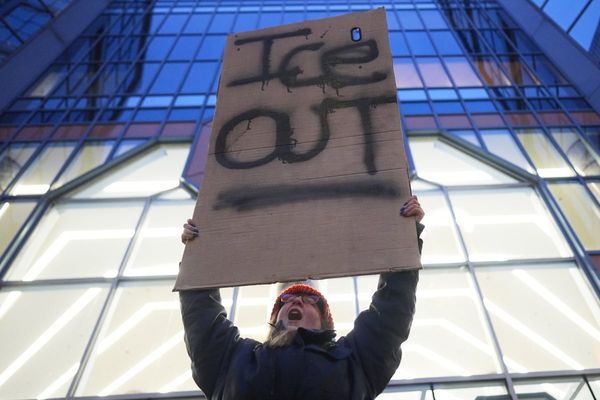They were once powerful allies who forged a bond through a brutal war and two palace coups.
Now, the two most senior men in Sudan have turned on each other and are locked in a bitter battle for control of the country.
Abdel Fattah al-Burhan is an ambitious career soldier overseeing Sudan's official military wing, its armed forces (SAF).
Mohamed Hamdan Dagalo was an outsider with a murky past who climbed through the ranks to become the head of the country's shadowy paramilitary Rapid Support Forces (RSF).
After meeting during a brutal military campaign in Sudan's south in the early 2000s, the pair developed a working relationship.
For years, their wealth and power relied on the favour of the country's autocratic leader Omar al-Bashir.
But when a months-long protest spilled over into a popular uprising that ousted the president in 2019, the two men schemed to control and then overthrow a civilian-led government.
After two years of attempting to rule together, their relentless grind for more and more power has fomented a deep mistrust that has broken down their marriage of convenience.
With their armies battling it out on the streets of Khartoum, the fate of Sudan may rest on who comes out on top.
The war that changed everything
Long before they became enemies, General Burhan and General Dagalo were two very different men whose paths crossed on the battlefield.
Burhan was the driven young soldier who rose through the ranks to become the chief of staff of the Sudanese Army.
Meanwhile, Hamdan Dagalo, an outsider to the ruling political establishment in Khartoum, dropped out of school after the third grade to eventually become a camel trader.
A tall, imposing figure, his grandmother jokingly gave him the nickname Hemedti, or "Little Mohammad".
But it was the grim conflict in the Darfur region that changed Hemedti's life.
In 2003, African Darfuri rebels began rising up against former president Omar al-Bashir's government, which was dominated by Sudanese Arabs.
An attack on a trade convoy killed about 60 people from Hemedti's family, according to his former assistant.
He responded by joining local Arab militias — known as the Janjaweed — who attacked non-Arab tribes on horses and camels.
The Janjaweed were accused of murder, rape, looting, torture and poisoning wells.
While Burhan controlled the Sudanese Army in Darfur, militia leader Hemedti caught the eye of then-president Bashir.
The Sudanese president reportedly treated Hemedti like his son, appointing him general of the feared RSF.
With the president as his benefactor and his own personal army behind him, Hemedti became a very rich man.
In 2016, he and his men seized control of the Jebel Amer gold mine in Darfur, which made the previous owner $US54 million ($80 million) a year.
Hemedti started shoring up his regional influence by supplying ground forces to the Saudi-led coalition fighting Iran-aligned rebels in Yemen.
But despite being arguably the most powerful man in Sudan, many experts said Hemedti had no chance of ever ruling the country.
Sudan's elite is largely made up of ethnic groups based around Khartoum and the River Nile.
"The Khartoum elites are unanimous that Hemedti cannot be the ruler of Sudan, because … he is from the wrong class and the wrong place," Alex de Waal, a Sudan expert at Tufts University, told AP in 2019.
President Bashir once gave Hemedti the nickname "Himayti", which means "My Protector".
But when protesters took to the streets demanding the end of his 30-year rule, the ultimate outsider teamed up with the ultimate insider to topple the president.
A palace coup secured the general's grip on power
In the final hours of his presidency, Bashir went to bed unaware of the full extent of the plot against him. When he woke, he went to pray.
"Army officers were waiting for him when he finished," a member of Bashir's inner circle, told Reuters.
The president's right-hand man and his third-most-senior general had seen an opportunity to grab more power for themselves.
Bashir was jailed on corruption and money laundering charges and could one day face the International Criminal Court for his actions in Darfur.
With a power vacuum threatening to engulf the country, General Burhan and General Dagalo made a pact to oversee a civilian-led government that would put Sudan on the path towards democracy.
General Burhan moved to a key position as the head of the body overseeing the transition, with General Dagalo acting as his deputy.
But there was a slight catch to their new arrangement: The deal was temporary.
With their grip on power under threat by pro-democracy forces committed to holding elections, the two men staged another palace coup only two years later.
"They have fears, they have interests and they have ambitions," Yasser Arman, an adviser to the deposed prime minister, told the New York Times in 2021.
The coup d'état against the prime minister was pulled off with devastating accuracy.
General Dagalo's RSF men were stationed on street corners, while General Burhan's men swiftly arrested five Sudanese government officials and switched off the internet.
Some protesters took to the streets shouting: "We are revolutionaries. We are free. We will complete the journey."
But they were no match for the generals in expensive suits.
Soldiers used live rounds to disperse the protesters, while groups of thugs beat the demonstrators who had gathered on the streets.
The collapse of a 'loveless marriage'
While Hemedti and Burhan initially worked together to rule Sudan, it appears that as time passed they found themselves unable to compromise when it came to power.
There is too much gold in Sudanese soil and too little trust among the nation's ruling class.
One unnamed foreign official told the New York Times their relationship was "a loveless marriage where they hate each other's guts".
The country has been under strict sanctions since the 2021 coup and international pressure was mounting to figure out a pathway back to democracy.
Things started to fall apart between Hemedti and Burhan over how they would consolidate the RSF and the Sudanese military.
"This is what makes both generals feel like this is now an existential conflict for them," Kholood Khair, founding director of Confluence Advisory, a think tank in Khartoum, told Axios.
"If they don't get rid of the other, then the other can supersede them."
The tension between them first started with private sniping, but last week escalated into a full-blown conflict between the RSF and the Sudanese military.
On April 15, Hemedti's forces released a statement claiming to have taken control of Khartoum International Airport, the Presidential Palace, state television, and other key locations in the city.
Since then, both forces have battled for key locations around the capital and residents have been caught in the crossfire.
The gentle hum of daily life in the city has been replaced by the piercing sounds of explosions and gunfire.
Locals have taken shelter in their homes as rival forces pound the area with artillery and air strikes.
Locals caught up in a bloody power struggle
Khartoum has now become a battlefield for two men who believe only one can reign supreme.
With both sides openly warring on the city's streets, diplomatic efforts across four continents have attempted to put an end to the fighting.
On Tuesday, it seemed as if the two sides were making progress towards brokering a peace when a temporary ceasefire was struck.
But shortly after it came into effect at 6pm local time, the capital was still experiencing violence, with both sides blaming the other for violating the agreement.
Another 24-hour humanitarian ceasefire attempt was made on Wednesday local time, but sporadic fighting continued.
Residents like Hadeel Mohammed, who were caught off guard when the battles first erupted over the weekend, have been trapped inside their homes ever since.
"My brother occasionally would take a walk outside to ensure, for example, the neighbours are OK, if they need electricity …" she told the ABC.
The war between the rival generals has been a "shock", she said, and no-one had time to prepare for what was to come.
"The first day, everyone was still taking in the news, no-one had time to really get into fight or flight mode or prepare themselves," she said.
"We didn't know how long this was going to last and the military is saying, 'Oh, we've got this under control, it's just going to be a day …'
"And it's lasted obviously longer than they've anticipated."
At least 12 hospitals around the capital have been forced to close until the violence ends, while satellite photos show damage to a number of sites, including to security service buildings.
Tens of thousands of troops from the rival militaries remain scattered around the city — as well as the nearby Omdurman — and residents are on edge.
Some Sudanese have been able to make their way out of the city, taking only what they could carry with them.
They live in hope the violence will end just as swiftly as it began.
Editor's Note 21/04/2023: An earlier version of this story referred to "ethnic Africans" being behind the uprising in Darfur. Later on April 21, we changed that description to be more accurate that it was Darfuri rebel groups who rose up against Omar al-Bashir's government.







